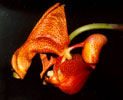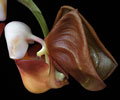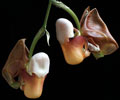|
|
|
|
|
| |
Flasks of
Coryanthes gernotii 'Co#318' -spontaneous |
|
| |
|
|
| |
| Number: |
TN1079 |
| Name: |
Coryanthes gernotii 'Co#318' -spontaneous
|
| Type: |
spontaneous (What's that?) |
|
Seed Donor: |
Dr. Gernot Bergold
|
|
Click to Enlarge

Pod Parent Flower |
Click to Enlarge

Offspring 'Ponche Crema' Flower |
Click to Enlarge

Offspring 'Ponche Crema' Inflorescence |
| Offspring photos are siblings of the plants you would receive. |
|
|
|
| |
For additional origin/habitat information supplied courtesy of
Charles and Margaret Baker, see further below, near the bottom of this page.
|
Temperatures we attempt to use in the lab & greenhouse:
| For Species: |
|
Using PSM, Winter, Spring: days average 77°F, nights 63°F; best fit is Intermediate 83-60°F
(Source:
Baker's Web OSC) |
| For Species: |
|
Using PSM, Autumn, Summer: days average 82°F, nights 61°F; best fit is Intermediate 83-60°F
(Source:
Baker's Web OSC) |
|
About the name...
| Etymology of |
Coryanthes |
|
From Greek "korys" helmet; "anthos" flower.
(Source:
Pridgeon 1992) |
| Etymology of |
gernotii |
|
Named for Dr. Gernot Bergold, virologist and orchid enthusiast of Venezuela in the 20th century, who specialized in the genus Coryanthes.
(Source:
Mayr & Schmucker 1998) |
| Pronunciation of |
Coryanthes |
|
ko-ree-AN-theez
(Source:
Pridgeon 1992) |
| Pronunciation of |
gernotii |
|
gair-NOT-ee-eye
(Source:
Troy Meyers) |
|
If you would like to direct someone to this web page, please copy and paste this URL into your email:
http://troymeyers.com/d?011079
| Flask Information |
| Availability: |
We had yield problems with this item, so we didn't continue flasking it. |
| You should: |
Consider placing a "Notify Retries" Request, and if an identical pollination (the same parents) is done again, we'll let you know. |
|
You might also want to:
|
View items of the same species.
View items of the same genus.
|
|
|
| |
The origin/habitat information below is supplied courtesy of Charles and Margaret Baker
The following information is based on the name of the plant provided by the donor, and assumes that the name is correct. If the plant has been misidentified, then the following information may not be correct.
This text is copyrighted by the Bakers and may not be reproduced without permission.
ORIGIN/HABITAT: Venezuela. Plants were found at about 3300-3950 ft.
(1000-1200 m) along the Rîo Calderas near Calderas in the state of
Barinas. Plants frequently grow in dense, secondary forest in areas with
relatively low humidity. They are always found colonized by ants of either
the genus Crematogaster, which is spread world-wide and harmless, or the
genus Azteca, which is found only in the neotropics and is stingless but
biting and aggressive.
More about this information and the Bakers...
|
|
|
| |
|
|
|